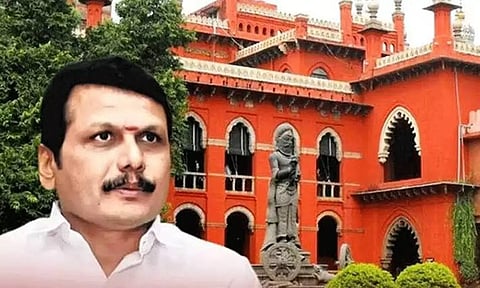

CHENNAI: The Chief Justice of the Madras High Court on Tuesday opined that the continuation of jailed Minister V Senthilbalaji in the Cabinet without a portfolio is against the morality and ethos of the Constitution, and said that Tamil Nadu Chief Minister M K Stalin may take a final call on the issue as the matter can't be decided by this court.
The case was heard by the first division bench of the Madras High Court (MHC) comprising Chief Justice S V Gangapurwala and Justice P D Audikesavalu.
The registry of the MHC scheduled the final orders of the case on Tuesday, and the petitions were disposed. However, the Chief Justice observed that the continuation of jailed Minister Senthilbalaji in the Cabinet without a portfolio does not augur well with the administration and is against the ethos of the Constitution.
Since Senthilbalaji's continuation in the Cabinet serves no purpose, the Tamil Nadu Chief Minister M K Stalin holding the prerogative powers over the Cabinet, is well advised to take a decision on his continuation.
J Jayavardhan, son of AIADMK leader and former Minister D Jayakumar, and another petitioner S Ramachandran filed a quo warranto petition against the continuation of Senthilbalaji in the Cabinet as Minister without portfolio.
Another petitioner M L Ravi filed a petition to quash the government order that allows Senthilbalaji to continue as minister without a portfolio in the Cabinet.
The counsels for the petitioners questioned whether a tainted and incarcerated person could be appointed as a Minister, and if so what duty he vested to serve while he was in prison.
The Governor has the power to remove a Minister under certain circumstances. The Governor removed Senthilbalaji with reasons hence this removal is fit to accept. Noting that the Governor kept the removal of Senthilbalaji in abeyance the Senior counsel argued that he could not revisit his actions again, submitted the counsels.
The AG appeared for the State said that the Governor cannot act on his own will, he must arrive at an opinion of the Council of Ministers, and he can only act in accordance with the advice of the Ministers.